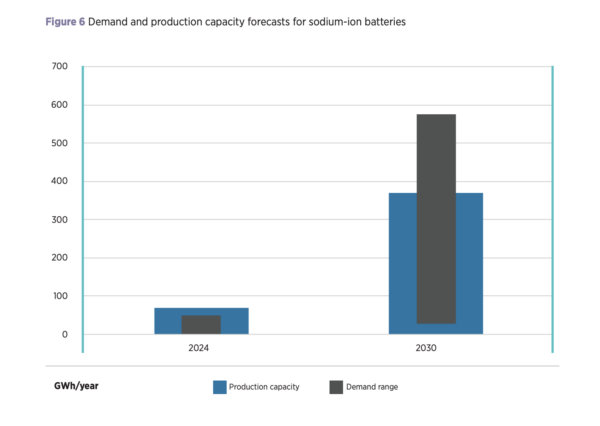Sodium-ion batteries (SIBs) could offer a promising cost-reduction alternative to lithium-ion batteries (LIBs), according to a report from the International Renewable Energy Agency (IRENA).
The agency’s “Sodium-Ion Batteries: A technology brief” report says that the case for SIBs first gained prominence in 2021, when lithium carbonate prices began skyrocketing, but as lithium prices have since come down, it remains to be seen whether SIBs will become a cheaper alternative to LIBs in the long term.
However, the report adds that SIBs may yet retain a competitive advantage over LIBs, with some manufacturers expecting the cost of SIB cells to drop to $40/kWh once production scales up.
SIBs hold a potential advantage over LIBs due to the abundance and accessibility of sodium, a material that is considerably cheaper than lithium. IRENA says the price of sodium carbonate between 2020 and 2024 ranged between $100/tonne and $500/tonne, while the price of lithium carbonate over the same period of time ranged between $6,000/tonne and $83,000/tonne.
Sodium is also around 1,000 times more abundant than lithium in the Earth’s crust and roughly 60,000 times more plentiful in the oceans, leading IRENA to suggest SIBs could help ease supply chain pressures and diversify the battery landscape, particularly amid the growth of electric vehicle deployment, which is expected to account for 90% of road transport by 2050.
The agency also suggested that SIBs can use more affordable materials in their construction, such as generally cheaper cathode materials like manganese and iron, and the use of aluminium collectors instead of copper ones in LIBs.
SIBs also have the benefit of higher cost-reduction potential than LIBs due to the technology remaining in its nascent stage to date, the report adds. Production capacity of SIBs is expected to reach up to 70 GWh this year, predominantly concentrated in China and dominated by layered metal oxide cathode chemistries.
While production capacity is expected to grow to 400 GWh annually by the end of the decade, IRENA points out that there is still uncertainty around the future market penetration of SIBs, with demand forecasts from different sources ranging from 50 GWh to 600 GWh annually by the end of the decade.

Aside from electric vehicles, IRENA says there is great potential for SIBs in stationary, large-scale energy storage as they offer promising safety features, good performance across a range of temperatures and competitive lifespans. SIBs could also play a particularly crucial role in low-temperature and high-temperature environments due to safety, where they can outperform LIBs.
IRENA adds that while the potential for SIBs is substantial, future capacity deployment remains unclear, with challenges relating to ensuring sufficient demand and a robust supply chain. The agency also stresses that SIBs should not be seen as a full substitute for LIBs, but rather as a complementary technology that can help ease some of the sustainability and availability concerns surrounding the battery supply chain.
“The long-term success of SIBs is likely to depend on a number of factors, including cost and material availability,” the report concludes. “Bottlenecks in the lithium supply chain, lithium shortages or higher lithium costs would all be likely to result in higher penetration rates for SIBs, while further cost reductions in LIBs would be likely to have a negative effect on SIBs demand.”
This content is protected by copyright and may not be reused. If you want to cooperate with us and would like to reuse some of our content, please contact: editors@pv-magazine.com.








By submitting this form you agree to pv magazine using your data for the purposes of publishing your comment.
Your personal data will only be disclosed or otherwise transmitted to third parties for the purposes of spam filtering or if this is necessary for technical maintenance of the website. Any other transfer to third parties will not take place unless this is justified on the basis of applicable data protection regulations or if pv magazine is legally obliged to do so.
You may revoke this consent at any time with effect for the future, in which case your personal data will be deleted immediately. Otherwise, your data will be deleted if pv magazine has processed your request or the purpose of data storage is fulfilled.
Further information on data privacy can be found in our Data Protection Policy.